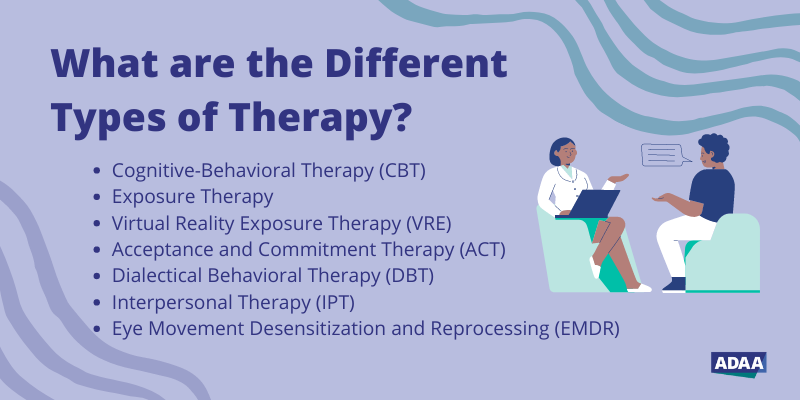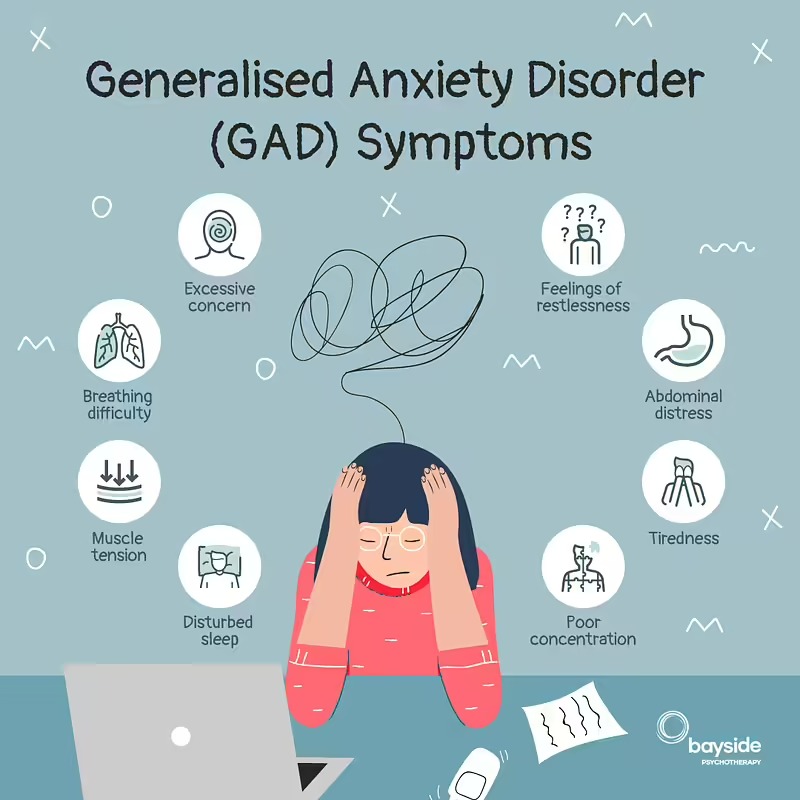Exploring Various Strategies in Counselling for Stress And Anxiety Disorder for Enduring Change
When taking on anxiety disorders, it's essential to explore a variety of counseling techniques. Each technique supplies one-of-a-kind insights and tools to assist you handle your signs and symptoms effectively. You might discover that integrating techniques can produce the ideal outcomes. Comprehending the subtleties of these strategies is essential to cultivating long lasting change. Suppose the best mix could launch a brand-new level of psychological wellness for you?
Comprehending Anxiousness Problems: A Brief Review
Anxiety problems, which impact countless people worldwide, can greatly influence everyday life. You might experience frustrating feelings of worry or worry that appear irrepressible. These sensations can result in physical signs like a racing heart, sweating, or also wooziness. Common types of anxiety conditions include generalised anxiousness disorder, panic disorder, and social anxiousness condition. Each has one-of-a-kind indications, however they all share a propensity to disrupt your regular and relationships.Understanding the root creates of your anxiousness is important. It could come from genes, brain chemistry, or life experiences. Identifying your triggers can help you handle your responses much better. It's essential to bear in mind that you're not the only one in this battle. Lots of individuals face similar challenges, and seeking aid is a strong action towards sensation much better. By discovering stress and anxiety problems, you're already on the path to understanding and handling your problem more properly.
Cognitive-Behavioral Treatment: Testing Adverse Idea Patterns
In Cognitive-Behavioral Therapy, you'll start by determining the unfavorable thought activates that add to your anxiety. You'll work on changing them with more favorable choices once you acknowledge these thoughts. Together, you'll develop efficient coping approaches to aid manage your stress and anxiety in daily scenarios.
Identifying Adverse Thought Triggers

When you experience minutes of distress, recognizing the particular triggers behind your unfavorable thoughts can be crucial in taking care of anxiety. Begin by focusing on circumstances that provoke feelings of worry or worry. Is it a jampacked space, a forthcoming target date, or a discussion with specific people? Take down these circumstances in a journal. This will help you identify patterns in your thinking. Notice physical experiences that accompany your unfavorable thoughts, like an auto racing heart or tightness in your chest. By determining these triggers, you get insight into what's sustaining your stress and anxiety. Recognizing these connections is the primary step in challenging those ideas and eventually restoring control over your psychological actions.
Changing Ideas With Positives
Challenging adverse idea patterns is an important step in changing your state of mind and reducing anxiousness. You may commonly find yourself entraped in cycles of insecurity or devastating reasoning. Rather than letting these ideas dictate your feelings, technique changing them with practical options or favorable affirmations. When you think, "I can not manage this," change it to, "I can manage difficulties one action at a time." This straightforward change can considerably influence your mood. Consistently identifying and countering these unfavorable ideas assists develop a healthier interior discussion. Bear in mind, it takes time and initiative, however continually practicing this method can cause long-term change, equipping you to deal with stress and anxiety with restored confidence and durability.
Building Coping Techniques Together
Changing adverse ideas is only the beginning of managing anxiousness properly. To develop enduring modification, you need to construct coping approaches that equip you. Cognitive-Behavioral Therapy (CBT) helps you recognize and test those unhelpful idea patterns. With each other, you and your counselor can explore just how these ideas effect your feelings and behaviors.Start by developing sensible methods, like journaling or mindfulness exercises, that allow you to challenge anxiousness head-on. When you face your concerns slowly, you'll discover to react in a different way.

Mindfulness and Acceptance-Based Approaches: Cultivating Present-Moment Awareness
As you navigate the intricacies of stress and anxiety, including mindfulness and acceptance-based strategies can significantly enhance your capability to grow present-moment awareness. By concentrating on the below and now, you'll discover that you can observe your ideas and sensations without judgment (Counseling services for anxiety). This practice assists you acknowledge your anxiousness without feeling overwhelmed by it.Engaging in mindfulness exercises, such as deep breathing, body scans, or assisted reflections, permits you to ground on your own in your present experience. Acceptance-based techniques motivate you to welcome your feelings instead than battle versus them. They shed their power over you.Incorporating these methods into your everyday regimen can change just how you react to anxiousness when you accept your sensations. You'll develop resilience and learn to browse stressful circumstances with higher ease. Inevitably, cultivating present-moment understanding lays the foundation for enduring change, equipping you to lead a much more satisfying life
Direct Exposure Treatment: Confronting Concerns Gradually
Exposure treatment assists you challenge your fears in a progressive means, making it less overwhelming. You'll discover methods to deal with anxiety-provoking scenarios detailed, while likewise building coping techniques to handle your responses. This approach empowers you to take control and minimize anxiousness with time.
Gradual Direct Exposure Techniques

When facing stress and anxiety, gradually confronting your concerns can be an effective means to reclaim control. This method, referred to as gradual direct exposure, involves gradually exposing yourself to the situations or things that trigger your anxiousness. Begin with much less daunting situations and progressively work your method as much as more challenging ones. For example, if you're worried of public speaking, you could start by talking before a mirror, after that proceed to sharing thoughts with a buddy, and ultimately address a small group. Each step helps desensitize you to the worry, constructing your confidence with time. Remember, it's important to pace yourself and celebrate little triumphes as you relocate with this procedure, strengthening your ability to handle anxiousness successfully.
Building Coping Approaches
Building effective coping approaches is important for managing anxiety, specifically as you challenge your anxieties progressively - Counseling services for anxiety. One effective method is direct exposure therapy, where you start by facing your concerns in a controlled fashion. Start with much less daunting scenarios and gradually function your method as much as more difficult situations. This progressive exposure helps desensitize you to anxiety triggers, making them less overwhelming.Incorporate leisure strategies, such as deep breathing or mindfulness, to relax your mind throughout direct exposure. Track your development, celebrating tiny success along the method to increase your confidence. Bear in mind, it's all right to take your time; the objective isn't perfection but steady renovation. By constructing these approaches, you'll equip yourself to navigate anxiousness click here and welcome life extra totally
Psychodynamic Therapy: Uncovering Source of Stress And Anxiety
Psychodynamic therapy explores the unconscious mind, disclosing the origin of your anxiety. By analyzing your ideas, sensations, and previous experiences, this technique assists you uncover underlying conflicts and unresolved concerns that might add to your present anxiety. You'll work with a therapist to examine childhood experiences, relationships, and emotional patterns that form your actions today.As you acquire understanding right into these deeper layers of your psyche, you'll begin to acknowledge how previous occasions influence your present actions. This understanding can result in catharsis, allowing you to refine emotions you might have suppressed.Through the healing connection, you can additionally determine defense reaction that may have developed with time, supplying a clearer course to change. Inevitably, psychodynamic therapy furnishes you with the devices to address your anxiousness at its core, promoting lasting makeover in your emotional health.
Integrative and Alternative Techniques: Combining Strategies for Greater Efficiency
Integrating different restorative strategies can enhance your journey towards managing stress and anxiety better. By incorporating elements from cognitive-behavioral therapy, mindfulness techniques, and holistic approaches, you can create an individualized strategy that addresses your distinct requirements. For example, you may make use of cognitive-behavioral techniques to challenge negative thought patterns while incorporating mindfulness exercises to ground yourself in the present moment.Additionally, exploring alternative methods such as yoga or meditation can promote relaxation and decrease stress and anxiety signs. This blend enables you to develop higher self-awareness and resilience.Experimenting with these varied methods can aid you uncover what reverberates most with you. Keep in mind, it has to do with discovering a harmony that works, rather than sticking to a single technique. This integrative technique not only provides immediate alleviation however also fosters lasting abilities for handling anxiety, encouraging you to recover control over your life.
The Role of Assistance Solutions: Building Resilience Via Connection
While it may seem that taking care of stress and anxiety is a solitary trip, having a solid assistance system can play a necessary function in your resilience. Bordering yourself with empathetic buddies, family, or support system develops a secure area where you can freely share your experiences and feelings. When you get in touch with others, you remind yourself that you're not alone in this struggle.These relationships offer motivation and can offer useful coping methods that have actually helped others. It's also an opportunity to gain point of view; friends can assist you see scenarios in a different way, reducing feelings of isolation.Moreover, emotional assistance cultivates a sense of belonging, which can considerably relieve anxiety signs. By leaning on your support group, you can build durability and deal with obstacles more successfully. Bear in mind, getting to out for help is an indication of toughness, and it can make all the distinction in your trip toward managing anxiety.
Often Asked Inquiries
What Are the Usual Symptoms of Stress And Anxiety Conditions?
You may experience uneasyness, exhaustion, trouble focusing, impatience, muscular tissue stress, and rest disruptions. Physical signs and symptoms can consist of quick heartbeat, sweating, and trembling. Recognizing these signs early can aid you look for proper assistance and treatment.
For How Long Does Therapy Normally Last for Stress And Anxiety Conditions?
Therapy for stress and anxiety disorders generally lasts anywhere from a few weeks to several months. It actually relies on your specific requirements, development, and the techniques your therapist makes use of to aid you handle your stress and anxiety efficiently.
Can Medication Be Used Along With Treatment for Stress and anxiety?
Yes, medication can absolutely be utilized alongside treatment for anxiousness. Integrating both methods typically enhances therapy performance, aiding you take care of signs while exploring underlying concerns via therapy (Counseling services for anxiety). Always consult your healthcare company for customized guidance
Are There Self-Help Techniques for Handling Stress And Anxiety?
Yes, there are numerous self-help methods for taking care of stress and anxiety. You can practice mindfulness, engage in regular workout, preserve a balanced diet plan, establish a routine, and make use of deep breathing strategies to help decrease anxiety signs and symptoms successfully.
How Do I Know if I Required Professional Assistance for Anxiousness?

Comments on “Compassionate and professional therapy for anxiety designed for you”